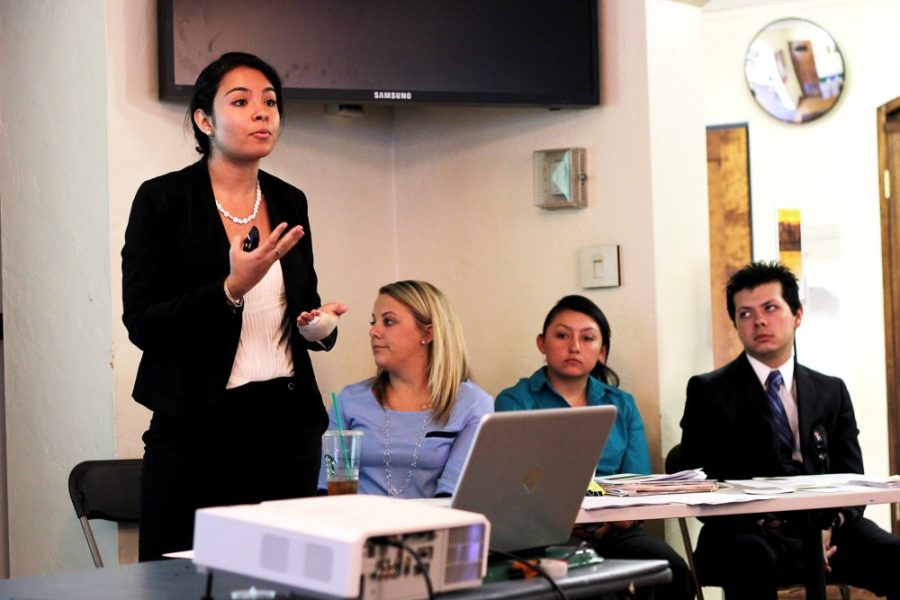UA students who work to identify remains found along the U.S.-Mexico border cited domestic policies as a cause of migrant deaths in a conference on Tuesday.
The students presenting at the Honors College shared their experiences working as interns at the Colibrí Center for Human Rights, a nonprofit that helps families locate loved ones who have gone missing while crossing through the Sonoran Desert into the U.S.
Dana Dobbins, a philosophy, politics, economics and law senior, said a large cause of undocumented migration is global economic change. She said there is now an increased need for labor, and therefore labor mobility, but inadequate channels for legal economic migration.
Dobbins cited the North American Free Trade Agreement as having had a large impact on the U.S. and Mexico. From 1995 to 2010, Mexico lost thousands of jobs as a result of American farm subsidies.
In Mexico, half the population lives at poverty level, and one-fifth of the people live in extreme poverty, Dobbins said. She added that the job market and economic growth in Mexico are weak, likely also causes for undocumented migration.
Alejandro Sustaita, a physiology senior, said that when NAFTA was formed, it was claimed that Mexico’s economy would improve to the point that illegal entry into the U.S. would be eliminated.
U.S. border policies maximize the rate and risk of apprehension of migrants, Sustaita said. The focused militarization of the border forces immigrants into more hostile environments in order to cross, he added, increasing both the cost of patrolling the border and immigrant deaths from exposure.
“Many successful border crossers can suffer from severe up to permanent physical and emotional trauma,” Sustaita said.
The increased difficulty of crossing has a rise in the use of coyotes, people who smuggle people across the border, he said. These coyotes are often associated with organized crime, according to Sustaita, and as a result, immigrants are more exposed to extortion, kidnappings and sexual violence.
Despite the high costs, in both money and deaths, border militarization does not deter migrants, he said. According to Sustaita, 92 to 95 percent of Mexicans who cross the border are successful.
“Basically, what it does is it reassures the public that strong action is being taken to protect them against the so-called immigration crisis, the war on terror, the war on drugs, the war on you-name-it,” he said.
Ahva Sadeghi, a philosophy, politics, economics and law junior, spoke about human rights, especially the right to mobility. The right to leave any country is protected by the Universal Declaration of Human Rights, Sadeghi said, but there is a lack of language about people’s rights to enter any country. She added that in order to implement a right to mobility, there must be a balance between open or absent borders and human documentation.
Dobbins also talked about the right to identification, especially after death. She said that identification, having a name, is part of being human. She said identifying the bodies of the deceased is difficult because they sometimes carry false identification or none at all.
The Colibrí Center works with the Office of the Medical Examiner. The OME uses forensics to try to identify bodies and gather DNA for later identification. The Colibrí Center communicates with families directly to close the gap between the bodies and their families, she said.
Iliana Rosas, a molecular and cellular biology sophomore, described the physical process of crossing the U.S.-Mexico border. Audience members were given cards describing a person crossing the border, including unaccompanied minors and pregnant women with small children.
Rosas explained that migrants often cross with inadequate clothing and rations. During the crossing, migrants often become dehydrated, sunburned and suffer from hypoglycemia, heat stroke and a lack of electrolytes, Rosas said. She added that some migrants, those with pre-existing medical conditions or injuries, are often abandoned by the group. If out of food or water, these people will enter the last stages of heatstroke, including muscle failure, hallucination, hypersensitivity and death.
Fear of the government and a lack of access to technology and information are some of the factors that make it difficult for families to find missing people, according to Dobbins.
Dobbins also spoke of the emotional impact of a missing family member. She discussed the effect of postmortem violence, the exposure of the body to the elements that destroys part or all of the body.
“Imagine your loved one has essentially been reduced to insignificance and become food for the animals,” Dobbins said.
— Follow news reporter Hannah Plotkin on Twitter @HannahPlotkin









